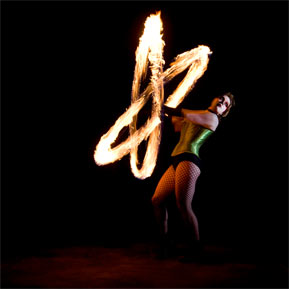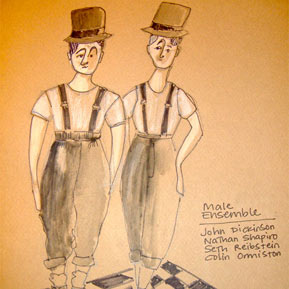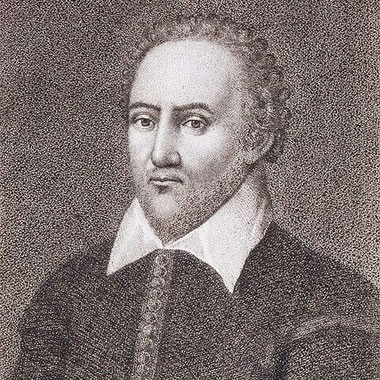—On the Subject
"These violent delights have violent ends."
Expect a brave and twisted approach to Shakespeare's iconic story of lovers in a dangerous time from MFA Directing Candidate Catriona Leger. One of Shakespeare’s most famous and best-loved plays, Romeo and Juliet has set the precedent for tragic love stories since it’s first performance in 1594. Love is the overriding theme of the play, but not the dainty expression of the emotion that bad poets write about. Love in Romeo and Juliet is a brutal, powerful emotion that captures individuals and catapults them against their world, and, at times, against themselves.
Drawing from the traditions of Bouffon, Clown and Cabaret, this theatre-in-the-round production will tickle, thrill and tantalize. Audiences will experience theatre as it was meant to be – LIVE.
A graduate of Ecole Philippe Gaulier in Paris, France, Catriona Leger worked for nearly 15 years in professional theatre across Canada as an actor, devisor, director, movement coach and instructor before becoming an MFA in Directing Candidate at UBC. Her specialized interests are in clown, bouffon and non-traditional approaches to classical text. She has served as an Artistic Associate with The Great Canadian Theatre Company and is currently Artistic Associate with Ottawa’s Mi Casa Theatre where she most recently directed Inclement Weather, which has toured across Canada and makes it’s US debut in January 2010. Catriona is a recipient of the JBC Watkins Award in Theatre from the Canada Council for the Arts and the Sidney J. Risk Award for Directing.
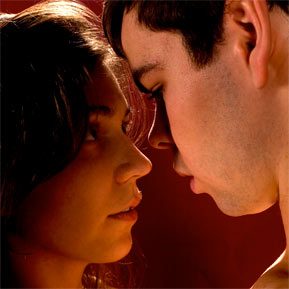
—Romeo and Juliet for Theatre at UBC
Actors L-R: Megs Chenosky and Jameson Parker
Photo: Tim Matheson
Romeo & Juliet features live music with a cast of 21: Theatre at UBC BFA Acting candidates Maria Luisa Alvarez, Megs Chenosky, Mishelle Cuttler, Eric Freilich, Sarah Goodwill, Claire Hesselgrave, David Kaye, Barbara Kozicki, Moneca Lander, Andrew Lynch, Fiona Mongillo, Jameson Parker, Christine Quintana, Ryan Warden, Ben Whipple, Joanna Williams, Tich Wilson and Russell Zishiri who are joined by John Dickinson, Seth Reibstein and Nathan Shapiro. The creative team includes professional artists Adjunct Professor Patrick Pennefather (Sound Design) and Nicolas Harrison (Fight Coach) with MFA Design candidates Ana Luisa Espinoza (Set) Conor Moore (Lighting) Carmen Alatorre (Costumes) and Stephanie Meine (Stage Management).
TELUS STUDIO THEATRE Jan. 20 – 30, 2010
Chan Centre for the Performing Arts, UBC
Romeo & Juliet, By William Shakespeare
Directed by Catriona Leger
Run: Jan. 20 – 30, 2010
Mon. – Sat. at 7:30 p.m.
Opening Night: Jan.21
Tickets: Reg. $25/Senior $20/Student $15 | $6
Preview: Jan.20
Mondays $5 for UBC Alumni
Box Office: 604.822.2678
—Introduction
romeo and juliet is a tragedy written early in the career of playwright William Shakespeare about two young "star-cross'd lovers" whose deaths ultimately unite their feuding families. It was among Shakespeare's most popular plays during his lifetime and, along with Hamlet and Macbeth, is one of his most frequently performed plays. Today, the title characters are regarded as archetypal young lovers.
Romeo and Juliet belongs to a tradition of tragic romances stretching back to antiquity. Its plot is based on an Italian tale, translated into verse as The Tragical History of Romeus and Juliet by Arthur Brooke in 1562, and retold in prose in Palace of Pleasure by William Painter in 1582. Shakespeare borrowed heavily from both, but developed supporting characters, particularly Mercutio and Paris, in order to expand the plot. Believed to be written between 1591 and 1595, the play was first published in a quarto version in 1597. This text was of poor quality, and later editions corrected it, bringing it more in line with Shakespeare's original text.
Shakespeare's use of dramatic structure, especially effects such as switching between comedy and tragedy to heighten tension, his expansion of minor characters, and his use of sub-plots to embellish the story, has been praised as an early sign of his dramatic skill. The play ascribes different poetic forms to different characters, sometimes changing the form as the character develops. Romeo, for example, grows more adept at the sonnet over the course of the play.
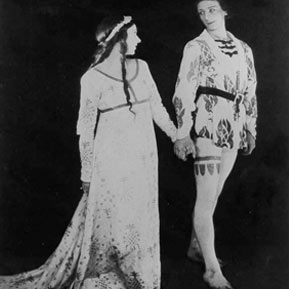
—Romeo and Juliet 1924
John Gielgud and Gwen Ffrangcon-Davies
The British Library
Romeo and Juliet has been adapted numerous times for stage, film, musical and opera. During the Restoration, it was revived and heavily revised by William Davenant. David Garrick's 18th-century version also modified several scenes, removing material then considered indecent, and Georg Benda's operatic adaptation omitted much of the action and added a happy ending. Performances in the 19th century, including Charlotte Cushman's, restored the original text, and focused on greater realism. John Gielgud's 1935 version kept very close to Shakespeare's text, and used Elizabethan costumes and staging to enhance the drama. In the 20th century the play has been adapted in versions as diverse as MGM's comparatively faithful 1936 film, the 1950s stage musical West Side Story, and 1996's MTV-inspired Romeo + Juliet.
